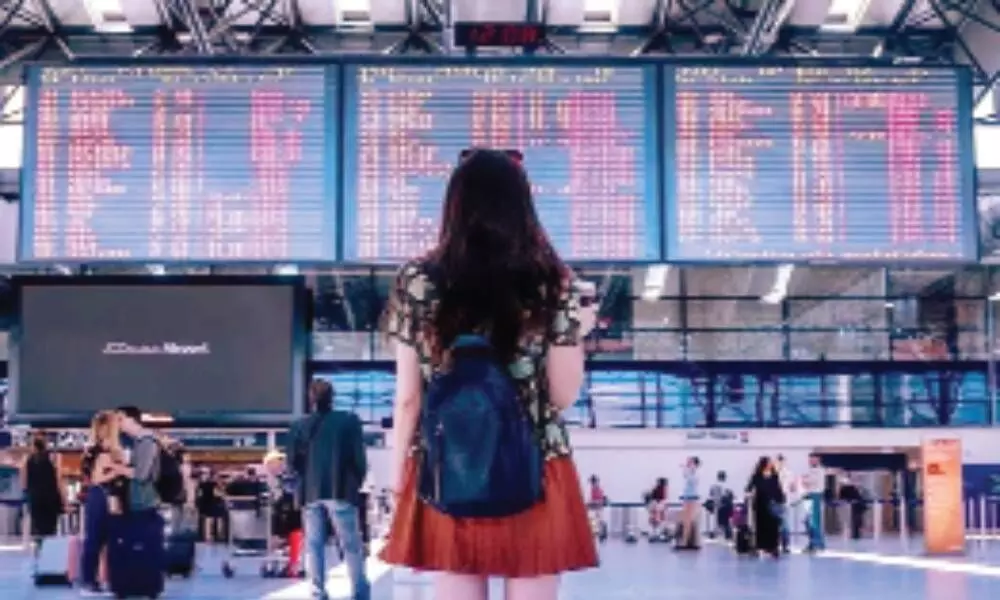Aviation, hospitality sectors need to work in tandem for revival
As of now, the travel industry will have to keep an eye on new regulation and guidelines, quarantine requirements, effectiveness of vaccines and the overall consumer sentiment
image for illustrative purpose

The year 2020 marked an all-time low for the travel and hospitality industry as the pandemic and resulting lockdowns brought travel operations to a halt. The year saw many airlines around the world filing for bankruptcy. A record number of people lost their jobs. As corporations continue to reduce travel expenses and leisure travellers prefer to stay at home, the travel industry and hospitality industry will have to work in tandem to revive.
The pandemic may have changed the travel industry forever, according to GEP Category Spend Outlook 2021. Travel operators who managed to survive the uncertain times now have to deal with a new list of regulations. Among these are passenger health screening, location sharing, onboard social distancing (by leaving the middle seat vacant), PPE kits, contactless kiosks and touchless elevators. Operators must be able to meet increased customer expectations, such as more flexibility in booking cancelations. Several guidelines related to travel and quarantine paint a gloomy picture for the travel and hospitality industry. The introduction of vaccines against Covid-19 has done little to lift the mood of the industry. In many countries, business travellers aren't certain if it is safe to undertake a trip now.
Growing popularity of the work-from-home culture has further compounded problems for the industry by reducing the need to travel frequently. Businesses are increasingly using advanced technology to enable employees to work from the comfort of their homes.
The mood of leisure travellers is not very different. Fearing health and safety, many continue to stay home and postpone any travel plans. The constant fear of getting infected with the coronavirus or requiring medical treatment is not likely to encourage any form of leisure travel. Like travel, the hospitality industry finds itself in the middle of a storm. According to studies hotels have to lay off employees. Many believe they would have to close their hotels if they do not get further assistance from the government. As vaccine inoculation picks pace globally, carriers hope the worst phase of the crisis is over. However, recovery is likely to take longer than expected. Domestic and international travel segments are expected to recover at different pace. Similar is the case for business and leisure travel. As of now, the industry will have to keep an eye on new regulation and guidelines, quarantine requirements, effectiveness of vaccines and the overall consumer sentiment. Travel operators are likely to offer lucrative discounts to woo passengers. It is important to remain focused on fundamentals: Safety, security, and efficiency. Special care should be given to promote public health and confidence among passengers, aviation workers, and the general public. Aviation is a driver of economic recovery. Aviation should be able to capitalize on the sector's longstanding experience and apply the same principles used for safety and security risk management. Measures should be supported by medical evidence and consistent with best health practices. They should be non-discriminatory, evidence-based, and transparent. They should also be cost effective, proportionate and not undermining to the equal opportunity to compete. The goal is to maximize consistency and progression to the next stage(s). It is currently not feasible to provide any specificity of timing between these stages.
Stage 0:
A situation with travel restrictions and only minimal movement of passengers between major domestic and international airports.
Stage 1:
Initial increase of passenger travel. This initial stage will coincide with relatively low passenger volumes, allowing airlines and airports to introduce aviation public health practices appropriate to the volume. Health measures for travel required at airports will need to, at a minimum match those from the hospitality industry, local modes of transport and infrastructure.
Stage 2:
As health authorities review the applicability of measures based on recognized medical criteria, passenger volumes will continue to increase. Several measures that were required in Stages 0 and 1 may be lifted. Health measures for travel required at airports will need to match those from hotels other local modes of transport and infrastructure.
Stage 3:
This stage may occur when the virus outbreak has been sufficiently contained in a critical mass of major destinations worldwide as determined by health authorities. The reduction of national health alert levels and associated loosening of travel restrictions will be key triggers. There may not be effective pharmaceutical interventions (e.g. therapies or vaccines) commonly available during Stage-3, but contact tracing and testing should be readily available.
Stage 4:
This stage begins when specific and effective pharmaceutical interventions are readily available in most countries. There may be a set of residual measures/mitigations that could be retained, although these should also undergo a periodic review process.

